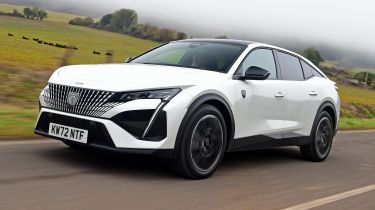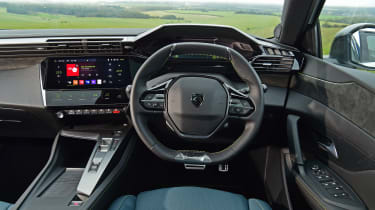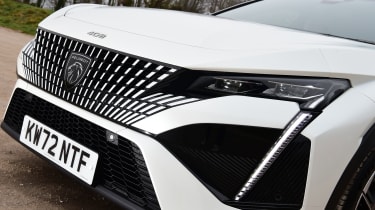New Peugeot 408 GT Puretech 2023 review
The Peugeot 408 is a comfortable, handsome alternative to its rivals, but is petrol-power the way to go?

Verdict
The unusual positioning of the 408 hatchback means that it’s likely to remain something of a niche choice for most buyers, but those who take the plunge will find plenty to appreciate thanks to its comfortable ride, spacious rear quarters and a lovely cabin. If you’re a private buyer, the PureTech petrol model is the pick of the range.
Peugeot’s new 408 is certainly a quirky car. It’s hard to work out whether it’s a conventional family hatchback, a compact executive saloon, or even a coupe-SUV. Perhaps this is what you get when you try to mix all of those things into one. We racked our brains with this when we sampled a 408 with a plug-in hybrid powertrain, but now it’s the turn of the petrol version that kicks off the range.
The key benefit to the non-hybrid option is price. The range kicks off with the Allure trim at £31,050 and climbs to the £34,650 GT trim. Compared to the lesser of the two PHEV models in the range (the better option of the two) that petrol model costs a significant £8,650 less. So what are you missing out on for the best part of nine grand?
Used - available now
One look at the specs of the two powertrains shows where the main deficit is. The PHEV models use a 1.6-litre turbocharged four-cylinder petrol engine, while the petrol-only model uses Peugeot’s PureTech 1.2-litre three-cylinder turbo. It’s already down on capacity, then, and that’s even before the extra help the PHEV gets from its electric motor.
The result is that the petrol sacrifices a decent chunk of power and performance. The PHEV makes a total of 178bhp whereas the petrol offers up 129bhp. Over a 0-62mph dash, that’s the difference between 8.3 seconds for the hybrid and 10.4 seconds for the pure combustion model. The three-cylinder petrol engine pulls along cleanly but sends vibrations through the cabin a little more regularly than the bigger powertrain. The eight-speed gearbox can be a little clunky at times, particularly at low speeds where it conspires with poor brake calibration and a stop/start system which makes driving in traffic a jerky, frustrating experience.
Then there’s the difference in running costs. Thanks to an 8 per cent Benefit in Kind tax banding for the Hybrid versus the lofty 32 per cent for the petrol, company car users will find the choice a no-brainer.
The petrol-only model averages up to 48.1mpg on the WLTP cycle, but the hybrids can cover many short journeys entirely on electric power. If you have a convenient place to charge, and do so regularly, you could save a bit of cash in the long run. However, it’ll take a very long time before the savings for a private buyer will claw the retail price differential back.
One area where the petrol does offer a clear improvement is in its ride and handling. Without a big battery to lug around the 408 PureTech weighs 304kg less than the hybrids. That can be felt through the corners, where it’s much more keen to change direction cleanly. The light steering takes a little getting used to, but it is precise.
Then there’s the ride comfort. The 408 is most closely related to the 308 hatchback, but we found that its longer wheelbase relative to the hatchback made a fairly supple ride that little bit more composed again. That goes a step further with the petrol, which rolls over some bumps without much fuss which the heavier hybrid can thump into more clumsily.
Free of the need to store electric motors and a battery pack, the PureTech is more practical, too. While knee and headroom are unchanged - the 408 excels at the former in particular - the petrol’s boot increases to a vast 536 litres - 65 litres more than the hybrids. There’s better storage further forward in the cabin as well, with a a much deeper central bin between the front seats.
The rest of the cabin is unchanged, which means that the 408 has pretty much any mainstream-brand rival beaten for quality, and even comes close to worrying a few premium alternatives.
But what are the closest rivals? Well, depending on whether you priorities the 408’s strong points of eye-catching design or practicality, then two jump out as being the closest alternatives. If design is your thing, then the Cupra Formentor makes an intriguing option; it’s a little more SUV-shaped than the 408, but still has a sporty profile and a unique look.
From a more pragmatic angle, the 408’s acres of rear space and roomy boot make the Skoda Octavia the closest match. It doesn’t quite have the wow-factor of the Peugeot, inside or out, nor does it have quite so much tech, but it does have even more space, and for £29,780, you could get an SE L trim with almost as much kit, plus more power.
| Model: |
Peugeot 408 GT Puretech |
| Price: | £34,650 |
| Powertrain: |
1.2-litre 3cyl turbo |
| Power/torque: | 129bhp/230Nm |
| Transmission: |
Eight-speed automatic, front-wheel drive |
| 0-62mph: | 10.4 seconds |
| Top speed: | 130mph |
| Economy/CO2: |
41.0-48.1mpg/133-156g/km |
| On sale: | Now |
Now read our review of the Citroen C5 X...













